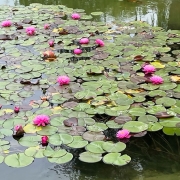Everyone Is Talking About It
In today’s world of TikTok Therapy, much is being said about attachment theory. It’s being used to explain any and every relationship issue from rejection to lack of commitment to feelings of suffocation. “Avoidants shouldn’t pair with Anxious-Attachments, blah, blah, blah,” the talking experts say. Yet little is being said how to address the extremely complex issue of attachment that every human on this planet struggles with in some way, shape or form. Put frankly, it’s an existential dilemma.
Attachment theory is a theory of psychology founded by John Bowlby that originally addressed relational patterns between infants, children and their care-givers. The main idea is that a child needs to have a secure attachment with at least one adult for normal, healthy development. The attachment styles discussed in child development are now being applied to theories of romantic attachment. In essence, it’s a way to explain the emotional bonds people have with one another. These categories are called anxious, avoidant, disorganized and secure. While nice to have this kind of spelled out, it doesn’t really address how we heal or navigate our day-to-day interactions with one another.
Not only that, circumstances change over time that can impact our current relational patterns. For instance, even if we had a secure attachment in childhood, we can certainly still be anxious if in a bad relational situation. Conversely, maybe we had insecure attachment in childhood but are blessed with a secure attachment now and in this situation, don’t really struggle.
What I find more interesting is the very human longing to return to the blissful state of fusion we had with our caregivers initially, if some kind of bonding occurred. That state of peering into our mother or father’s eyes while sucking on a breast or bottle of milk and completely melting into the CareGiver felt like nirvana. I am one with you, you are one with me, the infant thinks. I am whole, safe, and this feels pretty damn wonderful. The child does not yet experience itself as a fully, separate self and is highly insecure when left alone or in distress because she/he/they are so vulnerable. So when we have experiences in adulthood that create this sense of fusion – ecstasy in sex, the limerence of falling in love, being intoxicated on a substance, being in a flow state while creating, etc. we get a little taste of that. And that can feel very powerful and addictive. It can also be a little discombobulating when we can’t sustain these states and have to return to drab everyday life. Or, we fear being engulfed in this oneness and need a little separation to feel our ego state again. I don’t want to lose myself, we think going into a self-protective mode. You’re going to suck me in and my needs won’t matter.
In a way, this phenomenon is like the fall from Eden. We once felt this profound unitive state in the spiritual domain and now have to deal with the very real struggle of being human and/or separate from the CareGiver. We are drawn over and over again to that divine state of oneness, yet strive to be separate. To have agency, free will, choice, autonomy and individuality. Self/other/God. Me/you/world/God. And yet on some level, we all came from the same Star. We all have a spark of the Divine within us.
And so it is. Everyone is talking about it…

